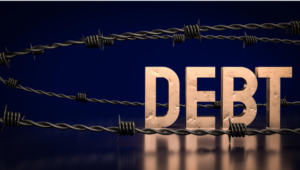
Financial Literacy Month: How to Stop Falling into the Debt Trap
This year’s Financial Literacy is helping us to brush up on our financial knowledge. It’s a perfect time to discuss a common issue that many Canadians struggle with—the debt trap. This financial pitfall can catch anyone off guard, leading to a cycle of borrowing. But it’s not the end of the world. With a bit of know-how and discipline, falling into the debt trap can be avoided. This blog aims to arm you with practical tips and insights that can help you stay financially fit.
Understanding Debt
Debt isn’t inherently bad. It’s a tool that, when used wisely, can help you achieve your goals. However, it’s crucial to know the basics of borrowing to use this tool effectively. Let’s break it down.
The Basics of Borrowing
Borrowing money is more than just getting the funds you need; it’s a commitment to pay back the amount with interest. Interest rate is the cost of borrowing. It can vary widely depending on the type of loan and your creditworthiness. The loan term also matters—it’s the time you have to repay the debt. Longer terms mean smaller payments, but more interest over time.
Good Debt vs. Bad Debt
Debts can be a strategic investment like a mortgage for a home that appreciates in value, often termed ‘good debt‘. On the flip side, ‘bad debt’ refers to high-interest debts, such as credit card balances, payday loans, etc. Good debt can be part of a financial plan, while bad debt can hinder your financial freedom. Prioritizing the payment of bad debts is essential to avoid the debt trap.
Recognizing the Debt Trap

It’s easy to fall into the debt trap without realizing it until you’re in over your head. Recognition is the first step towards prevention.
Warning Signs of the Debt Trap
The most glaring sign of the debt trap is when you consistently spend more than you earn, leading to a reliance on credit cards or loans for everyday expenses. If you’re only making minimum payments, or if you’re borrowing to pay off other debts, these are red flags. Another indicator is if a significant portion of your income goes towards debt repayment, leaving little for savings or other financial goals.
The Snowball Effect of Debt
Debt can snowball. It starts small, but as interest accumulates, the amount you owe can grow exponentially. Interest will grow, making it difficult to reduce the principal amount. Staying vigilant about your borrowing habits is crucial to avoid this snowball effect.
Strategies to Avoid the Debt Trap
To stay clear of the debt trap, it’s essential to have strategies in place. These act as safeguards to keep you financially healthy.
Budgeting and Spending Habits
Budgeting helps you to track income, control spending, and save money. Stick to your budget by prioritizing necessities, limiting luxuries, and cutting unnecessary expenses. Regularly review and adjust your budget to reflect changes in your financial situation.
Building an Emergency Fund
An emergency fund is designed to cover unexpected expenses, such as medical bills or car repairs. Aim to save three to six months’ worth of living expenses. This fund can prevent the need to take on high-interest debt in case of unforeseen circumstances. Start small, but remain consistent.
Smart Use of Credit
Credit can be a valuable financial tool if used wisely.
Understanding Credit Options
There’s a variety of credit options available, from personal loans to credit cards to lines of credit. Each has its own set of terms, interest rates, and repayment schedules. Educate yourself on these options and compare them to find the most favorable terms.
Managing Existing Credit
If you already have credit, manage it responsibly. This means making payments on time, keeping balances low, and not maxing out your credit cards. Understand the terms of your debts; some may have variable interest rates that can increase over time. Consider consolidating high-interest debts into a lower-interest loan to make repayment more manageable. Always keep an eye on your credit score, as it affects your ability to borrow money and the terms you’ll get.
Adapting to Financial Changes
Your financial situation can change due to various life events such as a new job, a growing family, or retirement. Adapt your financial strategies to align with these changes. For instance, a promotion might mean revising your budget to allocate more towards savings, whereas a layoff would require tightening spending. By remaining flexible and willing to adjust your financial plan, you can maintain control over your finances and avoid falling into the debt trap.
Seeking Professional Guidance

Sometimes, the best way to avoid falling into a debt trap is to seek advice from those who are experienced in helping people get out of debt
A debt expert can provide personalized advice tailored to your specific financial situation. They can assist with debt management strategies. You can speak with one of our debt experts at EmpireOne Credit to see how you can reduce or manage your debt. You can reduce your debt by up to 80%, and interest will stop immediately. Call us at (416) 900-2324 to schedule a free and confidential consultation. Being debt-free feels good!





